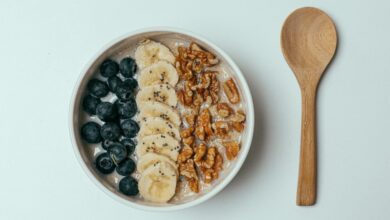
Are Protein Shakes Overrated? Debunking the Hype
Are protein shakes overrated? This question has become a hot topic in the fitness world, with opinions ranging from “essential” to “just another marketing ploy.” Protein shakes, often marketed as a quick and convenient way to boost protein intake, have gained immense popularity.
But do they really live up to the hype? Let’s delve into the world of protein shakes, examining their benefits, drawbacks, and whether they truly deserve a place in your diet.
From the macronutrient breakdown of a typical protein shake to the potential benefits for athletes and fitness enthusiasts, we’ll explore the science behind these popular supplements. We’ll also compare protein shakes to whole food protein sources, highlighting the importance of a balanced diet.
Protein Shakes

Protein shakes have become increasingly popular in recent years, particularly among fitness enthusiasts and those seeking to boost their protein intake. While they can be a convenient and effective way to supplement your diet, it’s essential to understand their nutritional profile and potential benefits to determine if they’re right for you.
Are protein shakes overrated? Maybe. But when you’re stuck in an airport with limited healthy options, they can seem like a godsend. To avoid the temptation of airport fast food, I always pack my own snacks. If you’re looking for healthy airport snack ideas, check out this list of 5 airport snacks that won’t pack on the pounds.
You’ll be surprised at how easy it is to stay on track, even when you’re traveling! Of course, if you’re really concerned about your protein intake, a protein shake might still be a better option than a greasy burger.
It’s all about finding what works best for you!
Nutritional Overview
Protein shakes typically consist of a protein powder base, often whey, casein, soy, or pea protein, along with other ingredients such as water, milk, fruits, vegetables, or sweeteners. The macronutrient composition of a protein shake can vary depending on the specific brand and ingredients used.
However, a typical shake contains a high proportion of protein, usually ranging from 20 to 30 grams per serving.
Role of Protein in Muscle Growth and Repair
Protein is essential for building and repairing muscle tissue. During exercise, muscle fibers experience microscopic tears, which need to be repaired and rebuilt for growth. Protein provides the amino acids necessary for this process.
Potential Benefits for Athletes and Fitness Enthusiasts
Protein shakes can offer several benefits for athletes and fitness enthusiasts, including:
- Increased muscle protein synthesis: Consuming protein after exercise can stimulate muscle protein synthesis, which is the process of building new muscle tissue.
- Improved recovery: Protein shakes can help replenish muscle glycogen stores and reduce muscle soreness after exercise.
- Enhanced performance: Adequate protein intake is crucial for maintaining muscle mass and strength, which can improve athletic performance.
- Increased satiety: Protein shakes can help you feel fuller for longer, which can be beneficial for weight management.
The Hype Surrounding Protein Shakes
The popularity of protein shakes has skyrocketed in recent years, driven by a combination of aggressive marketing campaigns, cultural trends, and a desire for quick and easy solutions to achieve fitness goals. This section delves into the tactics used to promote protein shakes and the common claims made about their effectiveness.
It also explores the cultural and societal influences that contribute to their widespread adoption.
Marketing Strategies Used to Promote Protein Shakes
Protein shake manufacturers employ various marketing strategies to entice consumers.
- Celebrity Endorsements:Protein shake brands often partner with athletes, fitness influencers, and celebrities to promote their products. These endorsements create an aura of legitimacy and effectiveness, appealing to consumers who aspire to achieve similar results.
- Appealing to Health and Fitness Goals:Marketing campaigns frequently emphasize the role of protein shakes in building muscle, losing weight, and improving overall health. They often target individuals seeking quick fixes or shortcuts to achieve their fitness goals.
- Focus on Convenience and Accessibility:Protein shakes are marketed as convenient and accessible solutions for busy individuals who may not have time to prepare healthy meals. They are often promoted as easy to mix and consume, making them appealing to those with hectic schedules.
- Aggressive Advertising:Protein shake brands invest heavily in advertising across various platforms, including television, social media, and online platforms. These ads often feature visually appealing imagery and persuasive messaging that can influence consumer choices.
Common Claims Made About Protein Shakes and Their Effectiveness
Protein shakes are often marketed with a range of claims about their effectiveness in achieving various fitness goals.
- Muscle Building:Protein shakes are marketed as essential for muscle growth and repair, particularly after exercise. While protein is crucial for muscle building, the amount required can often be met through a balanced diet. Studies suggest that protein shakes may provide an advantage in muscle growth for individuals who struggle to consume sufficient protein through food alone.
- Weight Loss:Some protein shakes are marketed as appetite suppressants or calorie-restricted options that can aid in weight loss. However, weight loss is primarily determined by overall calorie intake and expenditure, and relying solely on protein shakes for weight loss can be detrimental to overall health.
- Improved Recovery:Protein shakes are often promoted as aiding in post-workout recovery by replenishing muscle glycogen and reducing muscle soreness. While protein is essential for muscle repair, research suggests that the benefits of protein shakes for recovery are not significantly different from consuming protein from whole foods.
- Enhanced Performance:Protein shakes are sometimes marketed as improving athletic performance by providing a quick source of energy and protein. While protein is important for maintaining muscle mass and function, research suggests that protein shakes alone do not significantly enhance athletic performance compared to consuming protein from a balanced diet.
Cultural and Societal Influences on the Popularity of Protein Shakes
The popularity of protein shakes is also influenced by cultural and societal factors.
Are protein shakes overrated? It’s a question that pops up often, especially when you start digging into the whole concept of fueling your body. For me, it all comes down to understanding the difference between mindful and intuitive eating, which is something I’ve been exploring lately.
Breaking down the difference between mindful and intuitive eating has helped me realize that sometimes, our bodies just need simple, whole foods, not necessarily a manufactured shake, even if it’s packed with protein.
- Body Image and Fitness Culture:The emphasis on achieving a lean and muscular physique in today’s society has contributed to the popularity of protein shakes as a tool for body transformation. The desire to conform to societal beauty standards and achieve fitness goals often drives individuals to seek quick and easy solutions, such as protein shakes.
- Time Constraints and Convenience:Busy lifestyles and time constraints often make it challenging to maintain a balanced diet. Protein shakes offer a convenient and readily available option for individuals who struggle to fit healthy meals into their schedules. This accessibility makes them appealing to those seeking a quick and easy way to supplement their protein intake.
I’ve been thinking a lot about protein shakes lately, and whether they’re really all they’re cracked up to be. Sure, they’re convenient, but sometimes I crave something a little more substantial and flavorful. That’s where these banana oat greek yogurt pancakes come in.
They’re packed with protein and fiber, plus they’re absolutely delicious! Maybe protein shakes aren’t so overrated after all, but these pancakes are definitely a worthy contender for a healthy and satisfying breakfast.
- Social Media Influence:Social media platforms are saturated with images and videos of individuals showcasing their fitness journeys and promoting protein shakes as essential tools. This constant exposure can create a perception that protein shakes are necessary for achieving fitness goals, influencing consumer choices and contributing to the widespread adoption of these products.
Protein Shakes vs. Whole Food Protein Sources: Are Protein Shakes Overrated
Protein shakes are a popular supplement for athletes and individuals looking to increase their protein intake. However, it’s essential to consider whether these shakes are a necessary part of your diet or if whole food protein sources offer a more complete and balanced approach.
Nutritional Value Comparison
Protein shakes can be a convenient source of protein, providing a concentrated dose in a single serving. However, whole food protein sources offer a broader spectrum of nutrients, including essential vitamins, minerals, and fiber, which are crucial for overall health and well-being.
- Whole food protein sources, such as meat, poultry, fish, beans, and lentils, are rich in essential amino acids, which are the building blocks of protein. They also contain various vitamins and minerals, such as iron, zinc, and B vitamins, which are essential for energy production, immune function, and cell growth.
- Protein shakesare typically made from protein concentrates, isolates, or hydrolyzed proteins, which are derived from milk, soy, or whey. While they can provide a significant amount of protein, they often lack the fiber, vitamins, and minerals found in whole food sources.
Potential Downsides of Relying Solely on Protein Shakes
While protein shakes can be a convenient and quick source of protein, relying solely on them for your protein intake can have several potential downsides.
- Nutrient deficiencies: Protein shakes are often lacking in essential vitamins, minerals, and fiber, which are crucial for overall health. A diet that relies heavily on protein shakes may lead to deficiencies in these nutrients.
- Digestive issues: Some individuals may experience digestive discomfort or bloating after consuming protein shakes, especially if they are sensitive to certain ingredients or have lactose intolerance.
- Increased calorie intake: Many protein shakes are high in calories, and consuming too many calories, even from protein, can lead to weight gain.
- Potential for artificial ingredients: Some protein shakes contain artificial sweeteners, flavors, and colors, which may be detrimental to health in the long term.
Importance of a Balanced Diet with Whole Food Protein Sources
A balanced diet that includes a variety of whole food protein sources is essential for optimal health and well-being.
- Variety of nutrients: Whole food protein sources offer a wider range of nutrients, including essential vitamins, minerals, and fiber, which are crucial for various bodily functions.
- Improved digestion: Whole food protein sources are typically easier to digest than protein shakes, reducing the risk of digestive discomfort and bloating.
- Sustainable and ethical food choices: Choosing whole food protein sources, particularly plant-based options like beans and lentils, can be more sustainable and ethical choices than relying on protein shakes derived from animal products.
Potential Drawbacks of Excessive Protein Shake Consumption
While protein shakes can be a convenient way to supplement your protein intake, consuming them excessively can lead to several potential drawbacks. Excessive protein intake, especially from shakes, can strain your kidneys, dehydrate you, and disrupt your digestive system.
Additionally, relying heavily on shakes for protein can lead to nutrient deficiencies.
Kidney Strain, Are protein shakes overrated
Consuming excessive amounts of protein can put a strain on your kidneys. Your kidneys are responsible for filtering waste products from your blood, including nitrogenous waste produced when your body breaks down protein. When you consume more protein than your body needs, your kidneys have to work harder to filter out the excess waste.
Over time, excessive protein intake can lead to kidney damage, especially in people who already have kidney problems.
Dehydration
Protein shakes often contain high amounts of protein powder, which can lead to dehydration. This is because protein metabolism requires water, and when you consume a lot of protein, your body needs more water to process it.
If you’re not drinking enough fluids, you may experience symptoms of dehydration, such as fatigue, headaches, and constipation.
Digestive Issues
Excessive protein shake consumption can also lead to digestive issues. Some people find that they experience bloating, gas, and diarrhea after consuming protein shakes, especially if they’re lactose intolerant or sensitive to certain ingredients in the shakes. Additionally, protein shakes are often low in fiber, which can contribute to constipation.
Nutrient Deficiencies
Relying heavily on protein shakes for your protein intake can lead to nutrient deficiencies. Protein shakes typically contain a limited range of nutrients, and they may not provide all the vitamins and minerals your body needs.
For example, protein shakes are often low in fiber, iron, and other essential nutrients.
Final Thoughts
Ultimately, whether or not protein shakes are overrated depends on your individual needs and goals. While they can be a convenient and effective supplement for some, they should never replace a balanced diet rich in whole foods. Remember, moderation is key, and consulting with a healthcare professional or registered dietitian can help you determine if protein shakes are right for you.






